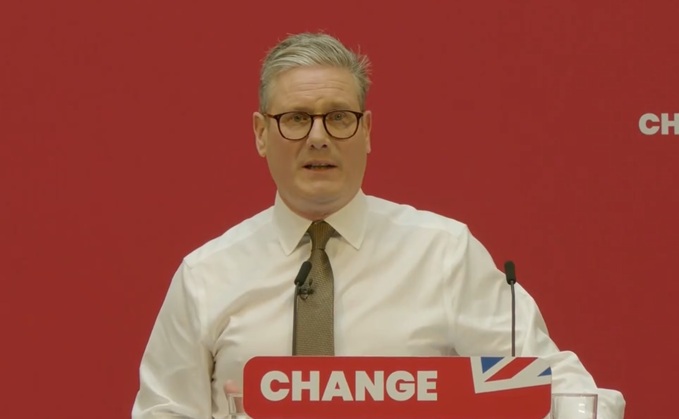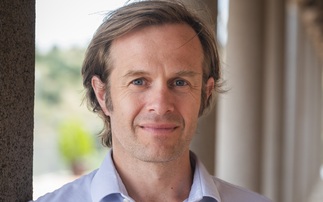Keir Starmer declares 'growth is our core business' as he confirms sweeping plans to establish the UK as a 'clean energy superpower'
Labour has today put green industries right at the heart of a manifesto that promises to revive the UK's economy, accelerate decarbonisation efforts, and ‘stop the chaos' that has engulfed the government in recent years.
In a manifesto that was widely described as taking a 'safety first' approach, Labour confirmed a raft of previously trailed green plans to set up a new GB Energy investment vehicle, pump billions of pounds into low carbon industries through a new £7.3bn National Wealth Fund, enact sweeping planning reforms to accelerate infrastructure development, ramp up investment in energy efficiency programmes, halt the issuance of new oil and gas drilling licenses, and deliver a clean power system by 2030.
Launching the manifesto this morning, Labour leader Keir Starmer said the Party was offering "a plan to change Britain" that was focused on supporting "wealth creation" and tackling barriers to economic growth.
"These challenges don't disappear overnight if Labour wins," he said. "We don't have a magic wand. But what we do have - this manifesto represents - is a credible, long-term plan."
He repeatedly stressed Labour's desire to work "in partnership" with business and highlighted the centrality of the green economy to the Party's economic plans.
"Wealth is our number one priority," he said. "Growth is our core business - the only route to improving the prosperity of our country and the living standards of working people. If you transform the infrastructure that supports our investment in our economy; if you transform the planning regime, start to unlock the potential of billions upon billions of pounds worth of projects that are ready to go, held up by the blockers of aspiration - that clearly does so much more for our long-term growth prospects."
He promised a Labour government would "reform planning rules, a choice ignored for 14 years, and build homes and infrastructure".
And he also confirmed Labour would introduce a National Wealth Fund that would "invest in clean steel and gigafactories" and help create 650,000 new jobs, arguing that the Party's "mission on clean energy, we can lead the way on climate" and deliver on government's responsibility to younger people.
The manifesto's green pledges were warmly welcomed by environmental groups, but there were also questions over whether the level of funding Labour is promising to mobilise will be sufficient to meet its hugely ambitious decarbonisation targets.
"Following the Tories' divisive manifesto, Labour's climate plans are like a breath of fresh air," said Greenpeace UK's head of politics, Rebecca Newsom. "Despite some major gaps on nature, the party clearly recognises the huge opportunity for green jobs, warmer homes and cleaner air that the green economy presents. And, unlike the Tories, Labour will bring an end to climate-wrecking oil and gas and turbo-charge renewable power - delivering genuine energy security and lower bills.
"But you can't deliver real change with spare change. So, after the bold green pledges and fair tax reforms set out by the Lib Dems and Greens, it's clear that Labour's plans don't go far enough. Repairing our crumbling public services, restoring nature and supporting vulnerable communities facing climate impacts is going to require government investment."
The manifesto pushes back at recent Conservative attacks warning Labour's plans to accelerate the net zero transition and deliver a clean power system by 2030 would push up costs for households.
"The clean energy transition represents a huge opportunity to generate growth, tackle the cost-of-living crisis and make Britain energy independent once again," the manifesto states. "The Conservatives have failed to grasp opportunities in this area for two related reasons. First, because they simply do not accept that economic growth, energy security, lower bills, and addressing climate change can be complementary. Second, because they are ideologically opposed to using the role of the state, including public investment, to guarantee that they are."
It also accuses the government of pursuing 'sticking plaster policies' that were exposed when Putin invaded Ukraine. "The cost of fossil fuel energy on the international market rocketed," the Manifesto states. "The Conservatives' ban on new onshore wind, failure to build new nuclear power stations, and decision to scrap investment in home insulation landed British families with amongst the highest energy bills in Europe. That is just one way we are paying the price. While countries around the world are racing ahead to claim the jobs and wealth that the transition offers, Britain is losing out. But it is not too late to stop the chaos and turn the page."
The manifesto argues Labour would unlock green growth and curb energy bills through a sweeping package of measures enabled by a new Energy Independence Act. The new legislation would work in conjunction with planning reforms, an accelerated grid connection regime, the new £8.3bn GB Energy venture, and private sector investment to "double onshore wind, triple solar power, and quadruple offshore wind by 2030", as well as increase investment in carbon capture and storage, hydrogen, marine energy, and long-term energy storage projects.
The document also confirms Labour would build on the current government's plans for new nuclear projects, including small modular reactors, and "maintain a strategic reserve of gas power stations to guarantee security of supply".
But it draws a clear dividing line with the Conservatives on plans for new North Sea oil and gas projects, confirming Labour would not issue new drilling licenses while promising to deliver a "phased and responsible transition" that sees existing projects continue and offshore workers' skills harnessed by growing clean energy industries.
In addition, the manifesto promises to introduce a "tougher system of regulation" across the energy market, including a crackdown on standing charges, and vows to speed up grid connections for new clean energy projects and "work with industry to upgrade our national transmission infrastructure and rewire Britain". But in both instances it provides little detail on what the proposed reforms would entail.
The section on planning provides more detail, with Labour promising to set out new national policy statements and update national planning policy "to ensure the planning system meets the needs of a modern economy, making it easier to build laboratories, digital infrastructure, and gigafactories". It confirms a Labour government would immediately update the National Policy Planning Framework to restore mandatory housing targets, remove the 'de facto' ban on new onshore wind farms, crack down on local authorities that do not have Local Plans in place, fund more planning officers, reform the system of compulsory purchase compensation, and take a strategic approach to greenbelt land designation to free up more 'greybelt'.
The manifesto confirms plans to invest an extra £6.6bn over the next parliament in energy efficiency programmes, doubling the existing planned government investment and enabling the upgrade of five million homes, while promising that "nobody will be forced to rip out their boiler as a result of our plans". And it announces plans to introduce the minimum energy efficiency standards for private rented properties that was scrapped by the last government, albeit by the later date of 2030. Labour said the rules would save renters hundreds of pounds per year, but at the same time.
The manifesto also confirms plans to boost public funding for a host of green industries through the National Wealth Fund, with £1.8bn assigned to upgrade ports and build supply chains across the UK over the course of the Parliament, £1.5bn promised for new gigafactories, £2.5bn to help transition to green steel plants, £1bn to accelerate the deployment of carbon capture, and £500m to support the manufacturing of green hydrogen.
The increased spending is to be supported through an increase in the windfall tax on the oil and gas industry and the closure of several 'loopholes'. The manifesto confirmed Labour would extend the sunset clause in the Energy Profits Levy until the end of the next parliament, increase the rate of the levy by three percentage points, and remove "unjustifiably generous investment allowances".
The plans, while being broadly welcomed by industry, have faced criticism from some quarters with campaigners warning the sums involved are unlikely to prove sufficient to deliver the green industrial supply chains necessary to meet the target of a fully decarbonised power system by 2030. Critics today noted that the level of green investment remains far short of the £28bn a year that was initially promised by Labour before the goal was controversially scrapped earlier this year.
"This manifesto aligns economic growth and net zero but it does not go far enough to boost resilience to extreme weather events, to safeguard us against future energy price spikes and will not crowd in the investment the UK so desperately needs," said Leo Mercer, policy analyst at the Grantham Research Institute on Climate Change and the Environment. "It's clear scaling back the original £28bn pledge on climate investment will be costly for the planet even if this manifesto shows more ambition than the Conservative Party. The focus on the just transition and resilience is welcomed, but the plans are light on detail."
Meanwhile, the oil and gas industry reiterated its warning that the plans would impact investment and jobs in the North Sea and could undermine the UK's energy security as it transitions towards a net zero emission economy.
But Ed Matthew, campaigns director at think tank E3G, argued the policy package should help to boost energy security and investment across the economy. "This manifesto will kick start a mission for energy independence and economic renewal, with net zero investment at its heart," he said. "Labour has recognised that upgrading our homes will be key; and we welcome the £13.2bn investment boost, and reinstatement of higher efficiency standards in the private rented sector. This manifesto gives hope that the UK's leadership in tackling the climate crisis will finally be restored."
Labour insiders have argued that while fiscal constraints mitigate against a major uptick in public spending on green projects, there is huge untapped private sector appetite for investment in clean energy which could be unlocked through effective planning and market reform alongside targeted public investment. In this context, the target of delivering a clean power system by 2030, while hugely challenging, would give a Labour government a mandate to deliver significant reforms to rapidly accelerate clean energy development.
The manifesto includes an endorsement of the plan from former chief scientific advisor Sir Patrick Vallance, who said: "A national mission for clean power by 2030 is achievable and should be prioritised. We desperately need to end the era of high energy bills, excessive carbon emissions and energy insecurity by accelerating the transition to clean, homegrown energy. Britain can lead on this by treating this mission like the vaccine challenge. We can be the innovators and the implementers, helping ourselves and exporting our solutions worldwide. But if we choose to go slowly, others will provide the answers, and ultimately we'll end up buying these solutions rather than selling them."
Elsewhere, the manifesto promises to restore the 2030 target date for ending the sale of new internal combustion engine cars, reversing Prime Minister Rishi Sunak's decision to push it back to 2035. It also pledges to accelerate the roll out of electric vehicle chargers, overhaul the rail network by bringing train operators back under public control as contracts expire, and lift the ban on municipal ownership of bus operators in a bid to create a more integrated approach to public transport.
And the manifesto confirms the package of measures on nature protection and farming announced by Labour last week, pledging to improve access to nature, expand habitats and boost tree-planting rates, "put failing water companies under special measures", introduce a new land use framework, and "make environment land management schemes work for farmers and nature".
Labour's Shadow Energy and Climate Secretary, Ed Miliband, said the Party was "offering the country the most ambitious climate and energy plan in British history - investing in our country through Great British Energy, our publicly owned energy company, so we can cut energy bills for good, make our country energy secure, create good jobs, and protect our home for our children and grandchildren by tackling the climate emergency".
You can now sign up to attend the fifth annual Net Zero Festival, which will be hosted by BusinessGreen on October 22-23 at the Business Design Centre in London.









